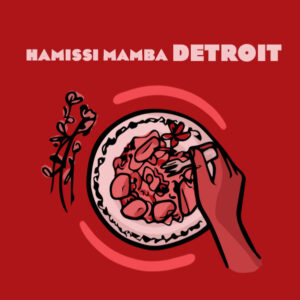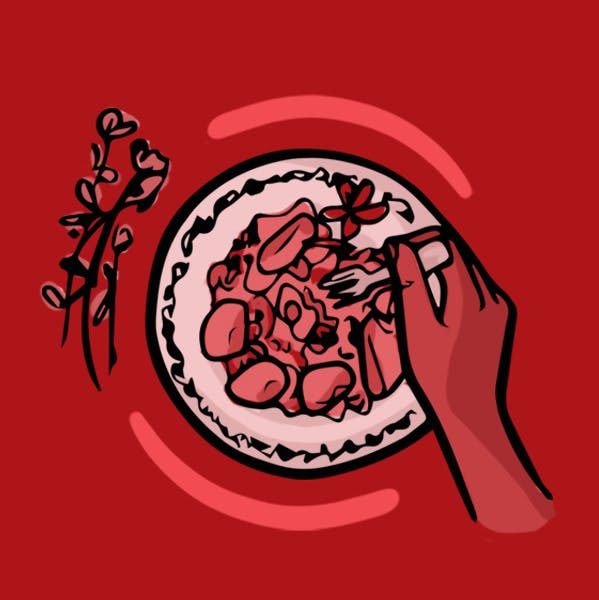Hamissi Mamba
To be a refugee is not just to arrive somewhere new and begin again, it is a journey of escaping a place of violence and war. It is to create a safer future for yourself and your family. It is brave. Over 70 million people in the world have been forced to leave their homes to confront more uncertainty, fear, pain, and yet, through it all, a hopeful and new life.

Hamissi Mamba and his wife Nadia are refugees from Burundi and co-owners of Baobab Fare, introducing East African cuisine to Detroit’s neighborhoods. Nestled in the Great Rift Valley of Eastern Africa, scarce in resources and hot 12 months a year, Burundi is currently the third-poorest nation in the world with many citizens starving and serious systemic issues. Arriving in the United States proved to be more difficult for their family than initially thought, as Hamissi was separated from his pregnant wife carrying twins for three years. “I got denied a visa on my first time. So I didn’t see my kids when they were born. And then I tried again for the second time. Unfortunately I got denied again. I tried a third time and got a visa. It was a long journey for me and my family because we were so distant. I became a dad for the first time when I saw them.”
It was Detroit’s Freedom House that was the safe haven for Nadia when she first arrived and later helped Hamissi integrate into American culture with ease. “You have a language partner. People will show you around. You have people you’re going to ask all the questions to because this is how you learn the land, this is how you learn the culture and where you’re going.” Freedom House is a shelter that accepts refugees from all over the world, also providing legal support, food, and other community services. Moving here without credit, a house, or land proved difficult when they wanted to open their restaurant. Without the help of their Detroit community and various local nonprofits who helped them set up their shop and advise on business, Hamissi and Nadia might never have opened up Baobab Fare.
After moving to the United States knowing minimal English, Hamissi would watch cartoons and integrate himself into society as much as possible to learn the culture. While he and Nadia both had degrees in Burundi, they had to find jobs outside of their field to support their family. With Nadia as the chef and Hamissi planning, the two have taken their restaurant from catering events and popups around the city to an actual space. They were set to have their grand opening on May 20, until COVID-19 hit. “We shut down everything, all the renovation we’re doing at the building at the site. Since the end of February, when COVID-19 hit the U.S. and the world, we’ve been very depressed because we sacrificed everything for three years and then it changed so quickly. We finally said, we grew up in this kind of situation. Every time, everyday you have a crisis and this is how we’ve grown up, but I’ll say the lesson we got from this kind of experience is, the one who’s being useful is the one who’s going to survive in this kind of crisis.”
Their positive outlook of this situation and their past experiences in Burundi translated into action. Nadia and Hamissi used their stimulus check to feed those in the community struggling. “Everybody was closing and we were like, no this is a good time because now we can rent or borrow a kitchen where we can go and cook for free. We started with only 20 meals. Then we cooked for four hospitals and one clinic. So, yeah, so far we have cooked 400 meals. Just me and Nadia.”
Hamissi was inspired by the people that surrounded him in his first days in this country, helping him acclimate and learn. “We’ve been, all the time, getting help from this country — now is a time to give back.” The generosity felt and given by their family has all been a learned part of their culture in Burundi. The hospitality and expectation to greet and help any and all people is what Hamissi loves most about his motherland. “Back home, it’s a problem of the whole community, it’s not only just your problem. You share your problems with others.” Hamissi and Nadia have made it a point to translate their values to their children by enforcing “When you’re inside the house, you’re in Burundi. When you’re outside, you’re in America.”
With the May protests for Black Lives Matter taking over virtually every major city in the United States, it seems Americans may finally be taking on some problems of those in our communities. Hamissi and Nadia knew raising two Black children as migrant parents in the United States would be difficult, and for that, have prepared them for their future. “The community that we’re in is not diverse at all. It’s a white community. It’s very good people. Why did we make that choice? We want them to be in an environment where they feel like this is where we belong. They belong everywhere. To make that decision was hard because we know they’re going to face a lot of racism but we want them to be ready when they’re still young. We are going to prepare them for life.”
Black lives belong anywhere and everywhere anyone else is, and Hamissi was eager to make that known when he attended his first-ever protest in early June. “I was so happy because this is my first time I’m able to go outside and protest without any fear. So that means I have the freedom. But this problem [we’re protesting about] is not only for white and Black [people]. It is an injustice problem. I had the same picture back home, where you have the minority and majority who are fighting, but the problem is not the people, the problem is the system, which has to be fixed.”
With the United States in dire need of systemic change, it helps to have the diversity and experiences of immigrants. “We can bring jobs. We can make something in the community so we can unite people. We can inspire. We can tell people about Africa and the whole story of colonialism. This is a platform. To show people who we are and why the problem is in Africa and why the problem is in the United States, why this is happening. I’m going to tell my story and then share what I have to heal, to help. I don’t know how it’s going to end. I don’t know how it’s going to go, but I like to enjoy every moment we are living and this is our journey.”
#CELEBRATE IMMIGRANTS
We all know someone with an immigration experience or have an immigrant heritage story of our own. Join us to stay updated as we #CelebrateImmigrants across the country!


